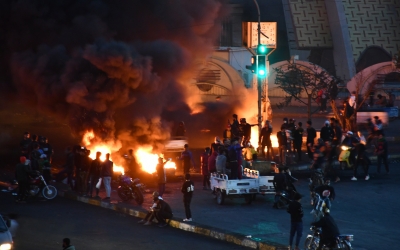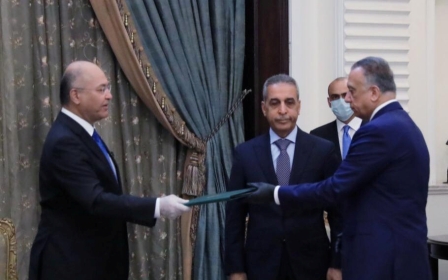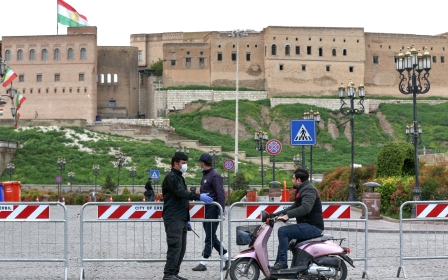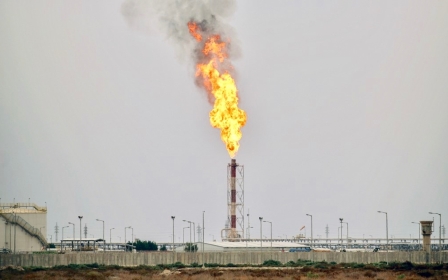'A patriot': Murder of activist in Iraq's Nasiriyah puts protesters on edge
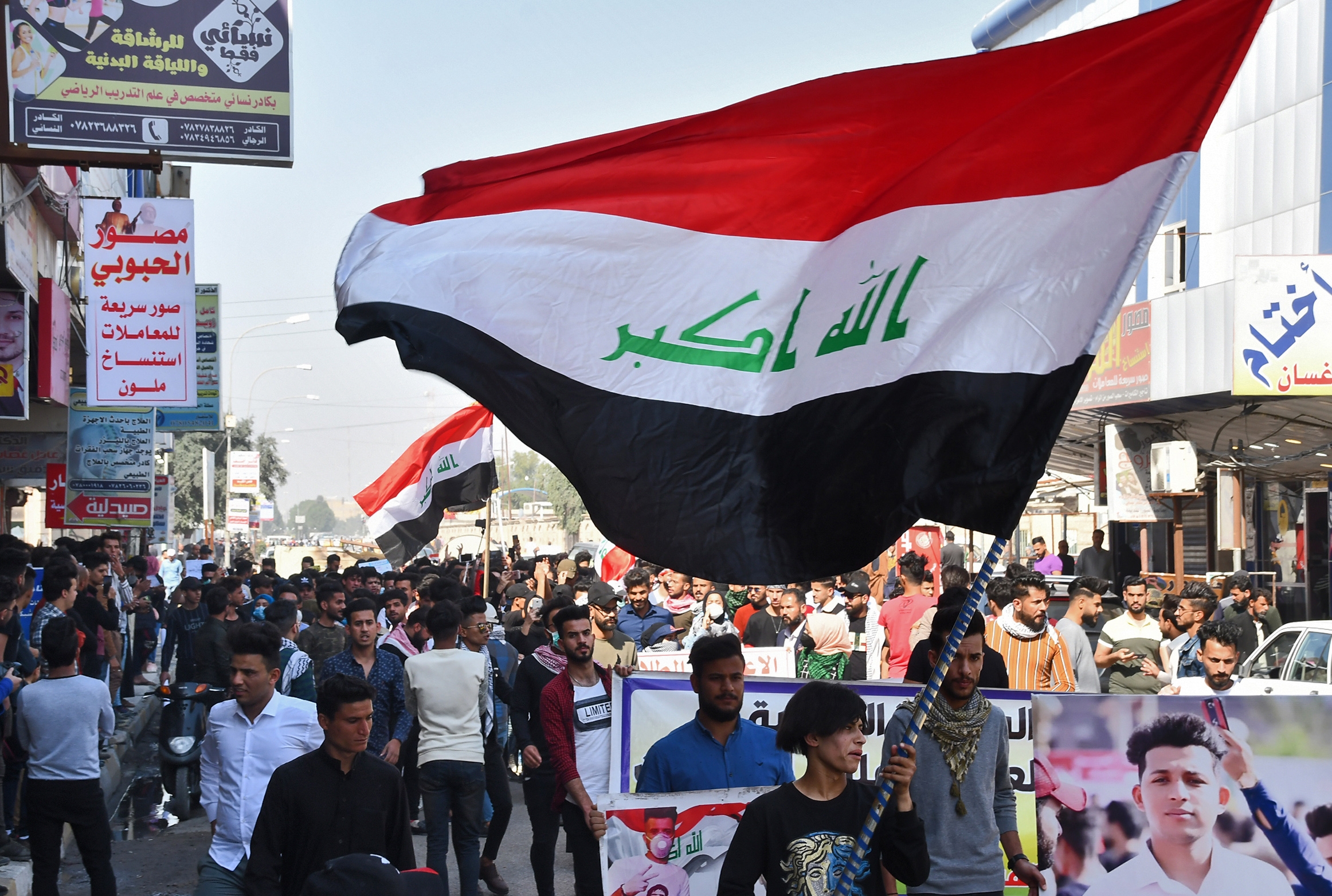
The murder of a well-known female activist in Iraq's rebellious south this week has reminded many of the dangers faced by the country's protest movement even amid the coronavirus lockdown in the country.
Despite an ongoing pandemic and the dire economic situation in Iraq, anti-government demonstrators have tried to keep their now six-month-long protest movement alive.
But protesters have remained highly vulnerable to attacks, as the murder of Anwar Jassem Mhawwas - known popularly as “Umm Abbas” - in the southern city of Nasiriyah in Dhi Qar province last Sunday shows.
According to a local source that requested anonymity, masked gunmen broke down the front door of her house before shooting her eldest son, Abbas, then followed Mhawwas inside and shot her five times. They then shot her second son while leaving the scene.
New MEE newsletter: Jerusalem Dispatch
Sign up to get the latest insights and analysis on Israel-Palestine, alongside Turkey Unpacked and other MEE newsletters
"[She] was assassinated inside her house while two of her sons were wounded," explained the source, who requested anonymity.
The streets of Nasiriyah as well as central Al-Haboubi Square were crowded last Sunday as a funeral procession took Mhawwas' body to the grave in defiance of social distancing rules.
The gathering came despite the imposition of a curfew by the Iraqi government aimed at preventing the spread of the coronavirus pandemic, which has so far killed at least 69 people in the country.
In March, as the threat of coronavirus became more apparent, demonstrators officially suspended the protest movement.
Mhawwas was well known for providing food to the demonstrators despite being amongst the poorest. She would also chant slogans in Al-Haboubi Square, which has become the epicentre for the town's protest movement.
A few days before her death she appeared in a video calling for the resumption of protests and for the breaking of the coronavirus curfew.
Her relatives explained that extreme poverty has left people without their daily necessities and that by remaining active in the streets of Iraqi cities, demonstrators hoped to pressure the government to act to support those most in need.
Many Iraqis work as day labourers and in informal employment and have seen their livelihoods put at risk by the new measures.
Divide over protests
While some protesters sympathised, most refused to gather to avoid risks of contamination.
"Attempts to break the quarantine curfew and calls made by activists caused confusion and brought public health concerns in the city while leading to clashes between demonstrators and security forces, as the majority of the activists in the movement do not support the curfew break," activist Raad al-Ghazzi told Middle East Eye.
Ghazi said he believed Mhawwas' murder was an opportunistic move aimed at weakening the protest movement.
“I believe the assassination of Umm Abbas is an effort to raise problems between the demonstrators to break the relatively peaceful relations with the security forces, in preparation for the removal of the tents of the sit-in protesters in Al-Haboubi Square," he said.
Another activist, who requested anonymity, said that the assassination was "an attempt to deter protesters from taking part in demonstrations and to set an example for other influencers to step back."
Last Monday, former Prime Minister Iyad Allawi condemned her assassination, denouncing it as a cowardly act on Twitter.
"The cowards... continue their dirty mission to put the lives of honorable patriotic men and women in danger, this time with the assassination of civilian activist Anwar Jassem," he wrote.
He added that "silence on this issue means condoning the crimes".
Ongoing crackdown
Hundreds of demonstrators have been killed and dozens of activists assassinated since anti-government protests began in October.
Protesters in Nasiriyah, which has become one of the main centres for the demonstrations, have long been subjected to threats and attacks.
'The loss of Anwar Jassem is a huge blow but we will follow her path and make her dream become reality one day'
- Walli Jabbar, activist
Before Mhawwas' murder, activist Abdullah Saleh was killed by masked men dressed as riot police. Another activist, Ali Khalid, was assassinated on the way back to his house by unknown gunmen in December.
A few days ago, activist Maitham al-Ibrahimi was also subjected to an unsuccessful assassination attempt.
“Some of the politically affiliated militias tried to spread rumors that Anwar Jassem was paid to agitate the protesters but she’s innocent of all these accusation. Her poverty and empathy for the needy ones was the reason she supported the protests. Umm Abbas, was a patriot and influencer who was ready to sacrifice from the first day of the protests last October,” said Walli Jabbar, a leading activist and founder of Sawt al-Haboubi, an independent radio station.
“The loss of Anwar Jassem is a huge blow but we will follow her path and make her dream become reality one day.”
A rebellious province
Dhi Qar province has long developed a reputation for rebellion.
Subjected to systematic repression by Saddam Hussein since 1979, marginalisation and poverty have shaped a revolutionary spirit in the population, and inhabitants of Dhi Qar have played an active role in all the insurrections in Iraq in the last century.
Protesters in Nasiriyah have, since October, expressed their rejection of the entire political class in Iraq, while also denouncing the Iranian-affiliated militias and their influence in the country.
Tribal forces have joined the struggle in the south of Iraq by pledging to protect their children from attacks by armed groups. This heavily armed and organised assistance has provided the protesters with a solid ally.
The situation remains deadlocked, but though Iraq’s economy is crippled by low oil revenues and an unprecedented health crisis, activists keep faith in their struggle.
“Due to the current situation the protests are now on hold, but the activists and the protesters swore to resume them as strong as ever once the curfew is lifted,” the anonymous activist from Nasiriyah explained.
“The minute we abandon the square, it will be impossible to return because the authorities will remove all the tents and place roadblocks to disrupt any future protests," he added.
“It is my duty to stay here to protect the tents where my fellow protesters live. We refuse to stop our mobilisation against corruption."
Middle East Eye delivers independent and unrivalled coverage and analysis of the Middle East, North Africa and beyond. To learn more about republishing this content and the associated fees, please fill out this form. More about MEE can be found here.


